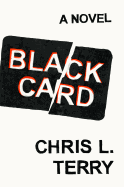
Chris Terry (Zero Fade) draws from personal experience in his provocative novel Black Card.
Like Terry, the unnamed narrator is the mixed-race child of a black father and white mother. The novel is structured around the narrator's identity crisis as he deals with all the racist trappings of Richmond, Va., where he works in a coffee shop and plays in a punk band called Paper Fire. The narrator reveals he turned to the mostly white punk scene because he felt alienated from other black kids growing up. He never felt he was black enough and still struggles to fit in. His black friend Lucius gives him a "black card," with black privileges written on the back, to affirm his identity. But when the narrator fails to confront racism, Lucius revokes the card, and the rest of the novel shows the narrator's attempt to get it back.
Terry's conceit provides plenty of humorous moments as the narrator switches back and forth between his whiteness and blackness. Terry works wonders describing the punk scene, his stylish prose revealing a deep understanding of music and counterculture. But for all the young and flippant hipster drama he covers, Terry never lets go of the serious social commentary at the heart of his novel. The narrator comes into his blackness after being targeted by the police for a crime he didn't commit. In this way, Terry reveals blackness as being the constant recipient of racist projections: "We're satellites. People's vision bounces off of us. The reflections glare in their eyes." What begins as a quest to be cool and comfortable in one's blackness becomes a greater struggle to survive.
Black Card is a bold and affecting novel--funny, infuriating and at times profound. Terry is a new talent who's managed to examine race in America like few writers before him. --Scott Neuffer, writer, poet, editor of trampset

